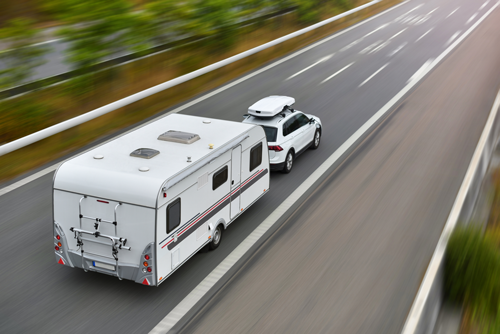Whether you’re moving to another city, taking a lot of recreational gear with you on vacation, or just helping out a friend, sooner or later you may find yourself hauling a trailer. Millions of Americans do it every year. But even if it’s just for a few hours, pulling a trailer behind another vehicle requires some preparation and certain driving skills that may be very different from what you’re used to.
Here are some tips for safer hauling:
A CHECKLIST BEFORE YOU GO
Preventing accidents while towing a trailer starts before you hit the road. The first order of business is to make sure you have the right equipment:
- You don’t want to take on a load that exceeds your vehicle’s towing capacity, the maximum weight that the vehicle can safely pull. Consult your owner’s manual for the vehicle’s tow rating.
- While you’re at it, check that the hitch ball on your vehicle matches the ball size on the trailer. A leading cause of trailer-related accidents are incorrectly sized trailer couplers. The trailer should fit comfortably over the hitch ball, without a lot of play or a forced connection.
- Before embarking, it’s worthwhile to develop a maintenance checklist for the trailer, similar to what you’d check out on a car before heading on a long trip. What shape are the trailer tires in? Do they need air? Is there a spare? Do the brakes (if the trailer has any) need adjusting? Are the running lights, brake lights, turn signals and hazard lights working properly?
- Depending on the vehicle you’re hauling with, you may want to take additional measures to insure a safe haul. If the trailer is wider than your vehicle, you may need to install tow mirrors that will reduce the blind spots and aid you in backing up. (Some newer vehicles offer blind-spot warning systems that work with trailers, too.) A set of wheel chocks is a good idea for securing the trailer from rolling when you have to disconnect it from the tow vehicle. You may need a specific lug nut wrench or other tools for the trailer you wouldn’t normally keep in your trunk.
HITTING THE ROAD
Hauling a trailer requires the driver to be on high alert and drive more cautiously than someone who isn’t pulling an extra few thousand pounds.
- Just like on a big rig, the driver has to reduce speed and allow for greater stopping distances from the traffic ahead.
- Turning corners is trickier, too; many first-timers turn too early and get a teeth-rattling encounter with a curb. Practice beforehand making wide turns at curves and corners, giving other drivers and stationary objects a wide berth.
- Since you’re reducing speed, it also makes sense to drive in the right lane on highways. That’s not only expected practice for slower traffic, it gives you quick access to the right shoulder in case of emergency.
- If your route includes mountain driving, or any kind of hilly terrain, be careful not to ride the brakes on downhill segments. Downshift as you can to slow the vehicle without overheating your brakes.
- Need to back up? Reached the end of your journey and ready to unload? It’s a good idea to have a spotter who can help guide you through a back-up and warn you about obstacles your tow mirrors don’t capture.
THE CAR ACCIDENT LAWYERS AT FDAZAR
For more than thirty years the attorneys at Franklin D. Azar & Associates have helped thousands of injured people obtain complete and timely compensation for their losses. Our proven track record and expertise in serious injury cases have allowed us to grow into the largest personal-injury law firm in Colorado, with offices in Denver, Aurora, Thornton, Fort Collins, Greeley, Colorado Springs, and Pueblo. If you’ve been injured in a bus, car, truck, or motorcycle accident, you may be entitled to compensation. Please call the car accident attorneys at FDAzar day or night or contact us here for a free consultation and no-obligation evaluation of your case.



